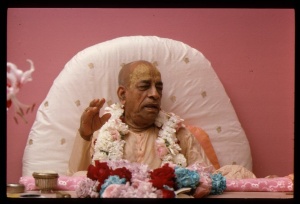CC Antya 8.21: Difference between revisions
m (1 revision(s)) |
No edit summary |
||
| Line 1: | Line 1: | ||
{{ | [[Category:Sri Caitanya-caritamrta - Antya-lila Chapter 08]] | ||
<div style="float:left">'''[[Sri Caitanya-caritamrta|Śrī Caitanya-caritāmṛta]] - [[CC Antya|Antya-līlā]] - [[CC Antya 8|Chapter 8: Rāmacandra Purī Criticizes the Lord]]'''</div> | |||
<div style="float:right">[[File:Go-previous.png|link=CC Antya 8.20|Antya-līlā 8.20]] '''[[CC Antya 8.20|Antya-līlā 8.20]] - [[CC Antya 8.22|Antya-līlā 8.22]]''' [[File:Go-next.png|link=CC Antya 8.22|Antya-līlā 8.22]]</div> | |||
{{CompareVersions|CC|Antya 8.21|CC 1975|CC 1996}} | |||
{{RandomImage}} | |||
==== TEXT 21 ==== | ==== TEXT 21 ==== | ||
<div | <div class="verse"> | ||
:"tumi—pūrṇa-brahmānanda, karaha smaraṇa | |||
brahmavit hañā kene karaha rodana? | :brahmavit hañā kene karaha rodana?" | ||
</div> | </div> | ||
| Line 12: | Line 16: | ||
==== SYNONYMS ==== | ==== SYNONYMS ==== | ||
<div | <div class="synonyms"> | ||
''tumi''—you; ''pūrṇa-brahma-ānanda''—full in transcendental bliss; ''karaha smaraṇa''—you should remember; ''brahma-vit hañā''—being fully aware of Brahman; ''kene''—why; ''karaha rodana''—are you crying. | |||
</div> | </div> | ||
| Line 19: | Line 23: | ||
==== TRANSLATION ==== | ==== TRANSLATION ==== | ||
<div | <div class="translation"> | ||
"If you are in full transcendental bliss," he said, "you should now remember only Brahman. Why are you crying?" | |||
</div> | </div> | ||
| Line 26: | Line 30: | ||
==== PURPORT ==== | ==== PURPORT ==== | ||
<div | <div class="purport"> | ||
As stated in the Bhagavad-gītā, brahma-bhūtaḥ prasannātmā: ([[BG 18.54]]) a Brahman realized person is always happy. Na śocati na kāṅkṣati: he neither laments nor aspires for anything. Not knowing why Mādhavendra Purī was crying, Rāmacandra Purī tried to become his advisor. Thus he committed a great offense, for a disciple should never try to instruct his spiritual master. | As stated in the [[Bhagavad-gita As It Is (1972)|''Bhagavad-gītā'']], ''brahma-bhūtaḥ prasannātmā:'' ([[BG 18.54 (1972)|BG 18.54]]) a Brahman realized person is always happy. ''Na śocati na kāṅkṣati:'' he neither laments nor aspires for anything. Not knowing why Mādhavendra Purī was crying, Rāmacandra Purī tried to become his advisor. Thus he committed a great offense, for a disciple should never try to instruct his spiritual master. | ||
</div> | </div> | ||
__NOTOC__ | |||
<div style="float:right; clear:both;">[[File:Go-previous.png|link=CC Antya 8.20|Antya-līlā 8.20]] '''[[CC Antya 8.20|Antya-līlā 8.20]] - [[CC Antya 8.22|Antya-līlā 8.22]]''' [[File:Go-next.png|link=CC Antya 8.22|Antya-līlā 8.22]]</div> | |||
__NOTOC__ | |||
__NOEDITSECTION__ | |||
Revision as of 04:44, 21 September 2021

A.C. Bhaktivedanta Swami Prabhupada
TEXT 21
- "tumi—pūrṇa-brahmānanda, karaha smaraṇa
- brahmavit hañā kene karaha rodana?"
SYNONYMS
tumi—you; pūrṇa-brahma-ānanda—full in transcendental bliss; karaha smaraṇa—you should remember; brahma-vit hañā—being fully aware of Brahman; kene—why; karaha rodana—are you crying.
TRANSLATION
"If you are in full transcendental bliss," he said, "you should now remember only Brahman. Why are you crying?"
PURPORT
As stated in the Bhagavad-gītā, brahma-bhūtaḥ prasannātmā: (BG 18.54) a Brahman realized person is always happy. Na śocati na kāṅkṣati: he neither laments nor aspires for anything. Not knowing why Mādhavendra Purī was crying, Rāmacandra Purī tried to become his advisor. Thus he committed a great offense, for a disciple should never try to instruct his spiritual master.